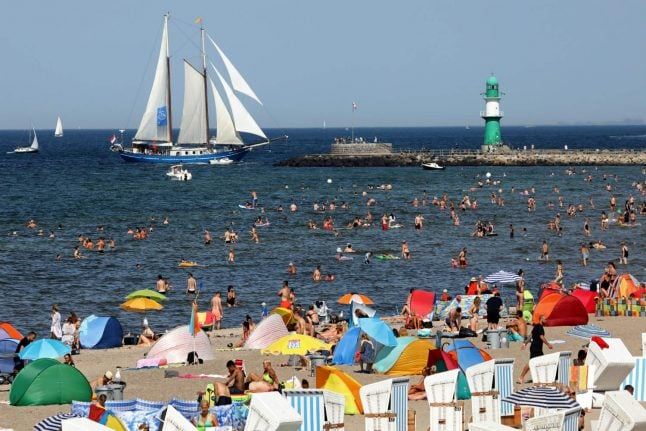Packed beaches on the North and Baltic Sea coasts, Alpine foothills overflowing with tourists: Despite a boom in travel to many holiday destinations, estimates suggest that the German tourism sector will be unable to make up for the losses caused by the coronavirus pandemic.
“The bottom line is that there will be no such thing as a German tourism boom this year. The losses sustained during lockdown were simply too high”, said Norbert Kunz, director of the German Tourism Association (DTV).
Now holidaymakers are faced with even higher prices when booking accommodation in particularly popular regions. Kunz spoke of price rises of up to 10 percent.
The North and Baltic Seas and the Alpine foothills are particularly popular amongst Germans at the moment, according to his observations.
Holiday accommodation by the coast in Mecklenburg-Western Pomerania has reached around 80 percent capacity for July and August.
READ ALSO: Holiday homes at North and Baltic Sea 90 percent full as Germans choose staycations
“However, this year not even the most popular regions will come close to matching last year’s profits,” Kunz told DPA. This is due in part to the fact that hotels, guesthouses, camping grounds, and also restaurants and cafes cannot operate at full capacity due to current social distancing regulations.
This problem is further compounded by a near total lack of foreign tourists in many regions. According to Kurz, there are not enough German holidaymakers to compensate for the resultant economic downturn.
At least 29 percent of Germans no longer have a holiday planned for this year, according to a survey conducted by the Consumer Research Association (GfK).

Tourists on the island of Usedom on June 27th. Photo: DPA
Those who do have a holiday on the horizon are mainly travelling to German destinations, above all to Bavaria and Mecklenberg-Western Pomerania. Seventeen percent of those surveyed are still planning a foreign getaway to other countries in Europe.
READ ALSO: Weekend Wanderlust: How to travel the world without leaving Germany
According to Kunz, regions such as the Thuringian Forest, Sauerland (in North Rhine-Westphalia) Eifel (a low mountain range in western Germany), Taunus (a mountain range located north of Frankfurt), the Brandenburg lakes and the Harz mountains are also profiting from the staycation boom.
Hotels in the Harz Mountains, for instance, reported a significant increase in bookings in June and July. Kunz described the shift as a “strong trend toward nature”.
READ ALSO: North or Baltic Sea? How to decide between Germany's two coasts
All in all, however, the Tourist Association sees no prospect of relief for the industries hardest hit by the coronavirus crisis.
“A fifth of all tourism businesses are fighting to survive, they are still dependent on government support,” explained the director of the Tourism Association. He called for the provision of Kurzarbeitgeld (financial support for workers with reduced hours) to be extended.
At present cover is available for up to 12 months. In addition, the obligation to file for insolvency is set to remain suspended until at least the end of September.
A ban on overnight stays for leisure purposes was introduced in Germany in mid-March due to the coronavirus pandemic. Individual German states lifted the ban at various points in the second half of May.
Translated by Eve Bennett.



 Please whitelist us to continue reading.
Please whitelist us to continue reading.
Member comments